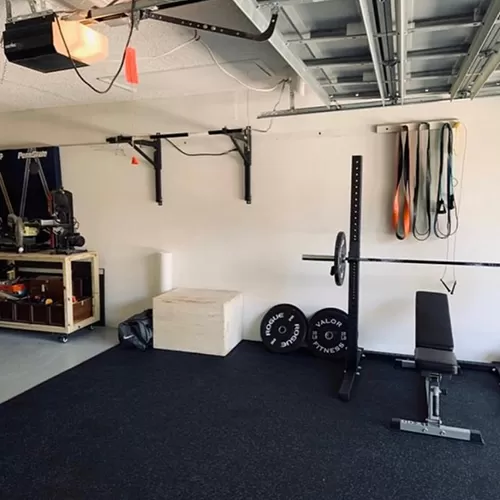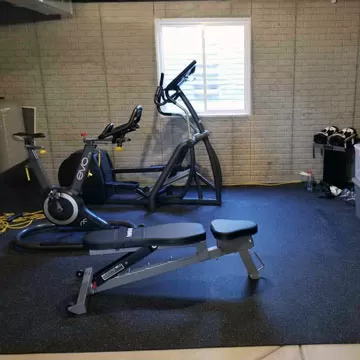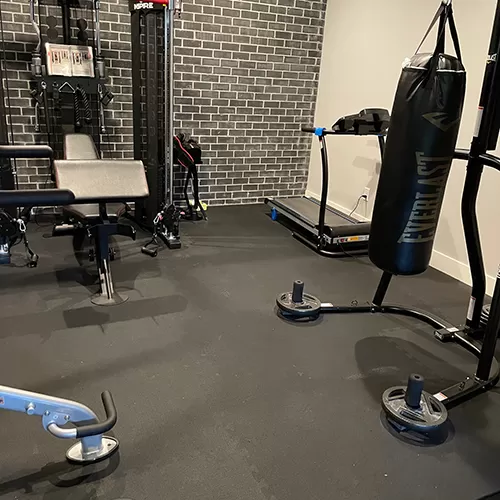What Is The Best Thickness For Home Gym Rubber Flooring?
Related Product: Rubber Flooring Roll Greatmats 1/4 Inch Colors 10 LF
Why Rubber Is Ideal for Home Gyms
Rubber flooring is a highly popular choice for use in both home and professional gyms. Rubber is a highly durable product that can withstand not only significant foot traffic, but that's backed by long warranties and makes for a long-term investment.More importantly, though, rubber’s shock-absorbing properties can withstand the impact of dropped weights. A rubber flooring product can protect your subfloor against impacts and damage.
While rubber offers valuable shock absorption properties, its density also makes it strong enough to support the significant weight of gym equipment. You can use rubber flooring under weight stations, treadmills, ellipticals, and other equipment without worry that the flooring will be damaged.

Rubber is also a comfortable material to stand and work out on. It offers enough traction to help keep you safe during a workout, and it’s easy to clean and maintain.
Since rubber flooring absorbs shock so readily, it is also excellent at absorbing sound. It can help to minimize the sound created by workout equipment, including dropped weights, so it can make your home gym a more enjoyable workout space.
You will also find that rubber flooring products are some of the more affordable home gym flooring choices available. Rubber products can be quite cheap, and there are plenty of options to choose from, including mats, rolls, and tiles.
Finally, rubber is an eco-friendly choice. Many of our products are made of recycled materials, so by choosing rubber flooring, you will be helping to keep old car tires out of landfills.
The Best Thickness for Home Gym Rubber Flooring
For rubber to best contribute to your gym, it needs to be the right thickness for the job. Determining the best thickness for home gym rubber flooring starts with determining how you plan to use the space.
Consider factors like the types of activities that you plan to perform in your gym, as well as the equipment that you will be adding to the space. This is particularly important when it comes to weightlifting.
Of all of the activities performed in a gym, weightlifting is one of the most demanding on your flooring. The amount of weight that you plan to lift will correlate with the flooring thickness that you should choose.
Thinner rubber flooring products have less shock absorption and are better paired with lighter weightlifting. Thicker products are better able to absorb the shock of a dropped weight, so they offer more protection to your subfloor.
These guidelines for free weights can help you to narrow down your flooring choices:
- ¼ inch flooring: For free weights up to 50 pounds
- ⅜ inch flooring: For free weights up to 120 pounds
- ½ inch flooring: For free weights over 120 pounds
- ¾ inch flooring: For intentionally dropped weights
- 1 inch flooring: For maximum vibration and noise reduction
As you shop for flooring, you will want to choose a product that is thick enough to support the heaviest weights you will use. Investing in a thicker product, even if you’re not sure you will need it, can help to protect your subfloor and prevent damage and expensive repairs.
Consider not only the weights that you are currently using but also the weights you are likely to use in the future. It never hurts to step up to a thicker flooring product, which will give you more flexibility in the weights that you might choose to use during your training and workouts.
Additional Considerations When Choosing Your Gym Flooring
As you explore the different rubber flooring available for your home gym, think about the type of product that is best for your space. Rubber tiles are easy to install and highly versatile, but they are one of the more expensive products.
Rubber rolls are an excellent choice for covering larger spaces, and they are the most economical products. Rubber rolls are available in a variety of thicknesses, including 8mm, ½ inch, and more, so you can use them to quickly transform an entire garage or a large section of your basement into a home gym.

If you’re working with a smaller area, like adding flooring to your weightlifting area, then a rubber mat may be the ideal solution. You can dry lay the mat on top of your existing flooring for additional shock absorption and protection, and can also remove the mat if you want to use the space for other purposes.

At Greatmats, we offer a wide variety of gym flooring options. Feel free to contact the Greatmats customer service department if you have any questions; we’re always happy to help you choose the product that’s right for your project.


